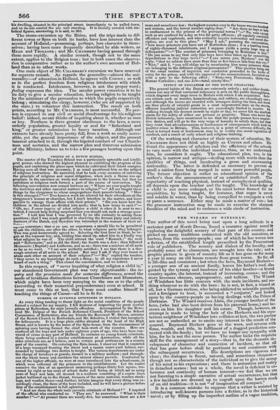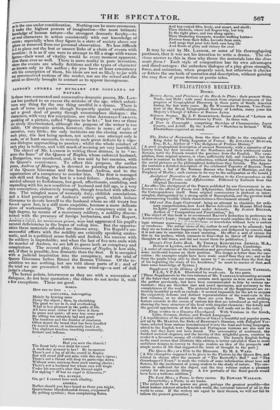THE WIZARD OF WINDSIIAW.
THE author of this novel being cast upon a long solitude in a secluded part of North Devon, found aresource against ennui In exploring the delightful scenery of that part of the country, and picked up many traditions connected with the old mansions, or bartons, from the country-people ; one of which he has woven into a fiction, of the established length prescribed by the Procrustean rule of publishers. The scenery and dialect of the locality, and probably some of its characters, are wrought into the talc; and a graphic picture is given of country life as it has gone on for many a year in many an old house remote from great towns. So far, all is life-like and consistent ; but when the hero, Raymond Herbert— a younger son of an ancient family, leaves his father's roof, dis• gusted by the tyranfiy and insolence of his elder brother—a brutal country squire, the interest, instead of increasing, ceases; and the story becomes obscure, unprogressive, and tedious. The Wizard of Windshaw has little concern with the main incidents, and no- thing whatever to do with the hero : he is not, in fact, a wizard at all, but a German recluse, who being addicted to scientific pursuits, and a foreigner to boot, is accounted a " conjuror," and looked upon by the country-people as having dealings with the Prince of Darkness. The Wizard receives Alain, the younger brother of the hero, (who had also been driven from his paternal home,) and be- stows on him his daughter and his estate. Though, however, an attempt is made to bring the heir of the Herberts and his mys- terious neighbour of Windshaw into collision at last, the two parties are not so embroiled as to excite any interest in the result of the quarrel. Raymond Herbert goes to the wars, and returns with fame, wealth, and title, in fulfihnent of a doggrel prediction con- nected with the family ; but we have no longer any sympathy with him, for he is not the same person. The author lacks the requisite skill for the management of a story—that is, for the dramatic de- velopment of character and connexion of incident, so that all that has gone before shall be pertinent to and consistent with the subsequent occurrences. His descriptions are vigorous and clear; the dialogue is fluent, natural, and sometimes eloquent— though not so characteristic of the individual as to give the stamp of his mind to his expressions; and there is animation and reality in detached scenes : but as a whole, the novel is deficient in co- herence and continuity of human interest—we feel that we are not listening to a simple narrative of actual occurrences, but that a few incidents are dressed up to engraft upon the barren stock of an old tradition—it is not " of imagination all compact."
It is a common mistake to suppose that a writer is assisted by introducing well-known persons into a fiction, as in the historical novel ; or by filling up the imperfect outline of a vague traditions
0 in the one under consideration.Nothing can be more erroneous. It tasks the highest powers of imagination—the most intimate
knowledg i
e of human nature—the strongest dramatic faculty—to i get real characters in action consistently with our knowledge of events; especially when they figure in a state of society above our Ore or removed from our personal observation. No less difficult is it to piece out the lost or unseen links of a chain of events with invention : it is as if one were to attempt to fill a stage with waxen ogures—their want of vitality would be every moment apparent, dreg them ever so well. There is more reality in pure invention, where the events are wholly fictitious and the types of character ere known only to the author ; for you have at least consistency with his conception of them, his ideas are not so likely to jar with oily preconceived notions of the reader, nor are the actual and the unreal so directly brought in contact as to appear incongruous.



























 Previous page
Previous page